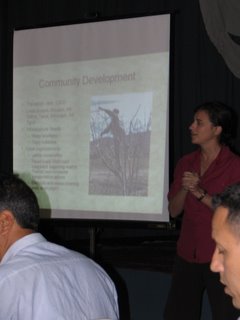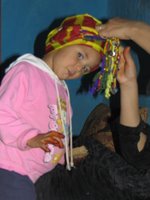I did, however, get an unusual perspective on these cities, as I was traveling with Mina, a teacher at Assoul’s nedi and member of our cooperative-to-be. Although somewhat better-traveled than most of the women with whom I work, this was a new experience for Mina as well, culminating in utter confusion as to what was going on after we got into the elevator of our swanky Agadir hotel for the first time. Anyway, while I suspect she struggled to understand everything that was going on – some of the big picture Moroccan government policy discussions, for example, as well as the fact that all of our sessions were translated into Arabic, which is her second (and only) language after Tamazight – I was really excited that she had this opportunity to come and learn about the work of other artisans and volunteers, which I hope she will share with the women in Assoul. I also convinced her to participate briefly in my project presentation to the volunteers, “counterparts,” and government officials in attendance by showing some of the women’s products. Not many counterparts or artisans did this, and I thought it was a great confidence-building exercise for her. (Even finding women with the confidence to travel at all remains a challenge in my site).
Here is me presenting my fabulously rushed PowerPoint presentation about Assoul:

I’d even taken my computer to the nedi a few days before I left for Agadir (where Bzi told me it was the first computer the women had seen – a reminder to me to be careful of advertising my wealthy western possessions and lifestyle too carelessly), in order to get feedback from some of the women on what I planned to say about their work. Sometimes I struggle with them, but I really want them both to feel involved and to understand that I have been paying attention and trying to begin responding to some of their needs.
Anyway, training sessions kept us busy all day, and I would hardly label it one of my more relaxing weeks in Morocco, although by the end of the week most of us had managed to use our lunch breaks a little more creatively in order to enjoy a little poolside time at least. And of course I managed one or two seaside strolls. On the whole, however, the strip was quite touristy and developed (hello McDonald’s and Pizza Hut, although I do admit to dining at the latter one time, although only because a friend and I got lost looking for a Mexican restaurant we’d heard about). Granted, a welcome change of pace from Assoul, but still perhaps not somewhere I would have gone on my own.
Here’s a view from my hotel room:

I also had to take another oral language test. Whatever. Berber I am not. I didn’t even ask what my score was, but was happy that I at least understood all the questions the tester asked me (unlike what happens when I talk to people in Assoul!).
On my way back I stopped through Marrakech again with some friends (and this time no Berber ladies – finding the city a little easier to handle in that respect). Sadly, far too tired to take advantage of the city’s nightlife, although I went with some other volunteers to price yarn at a carpet store in the souk, and there was substantial strolling through the famous Jemaa el Fna (known for its array of snake charmers, storytellers, musicians, spiced tea, etc.). Also, for reasons I won’t get into here, I felt in need of a little shopping therapy – something in which I almost never indulge in Morocco unless DVDs are involved – and bought these awesome slippers:

Had to talk the guy down from 600 dirhams to 150. But I still hate bargaining (apart from just being poor, the bargaining is a big reason I don’t shop much here – I’d rather pay more and be non-confrontational). And God knows when I’ll ever wear these (certainly not through the donkey dung in Assoul!), but they sure are pretty!
Then, having been called last-minute for a meeting in Rabat later in the week, I stopped in Khenifra to break up my trip up north. The last part of that bus ride was a nightmare – not nearly as bad as some of the mountain passes I’ve been on elsewhere in this country, but nauseating all the same. And everywhere that I’ve traveled in Morocco, the puking is common enough that most folks know to carry or ask for a “mika” (plastic bag – usually black for this purpose) when they’re riding in a bus, taxi, or transit and feel the upchuck coming. Taxis are somewhat better (and you can ask them to stop at least, but even then I’ve still had a woman draped across my lap with her face in a mika), but pretty much every bus or transit trip, you’re aware of all sorts of activity of this sort, which Moroccans, for the most part, tend to handle fairly nonchalantly. Truly, these may be my people after all. I’ve even hopped off my transit in Rich early morning to find a girl hunched over and gagging, only to promptly look up, smile, and say hi to me as though she was perfectly fine again. However, sometimes, the system fails. I did end one transit ride with vomit on my backpack, thanks to the woman beside me. And during this trip to Khenifra, at a point when I was already beginning to feel a bit ill myself, I suddenly heard an unusually loud retching sound coming from directly behind me. Turns out the woman in fact had a mika, but somehow missed it and puked all over the floor. Then, one of her traveling companions got to cleaning the floor the way Moroccans always do, by pouring water all over it. So there was a nice little river of vomit down the aisle. And then, as a flourish, the puking woman took a swig of water and spit it out in the middle of this mess. It is a wonder that I made it the rest of the way to Khenifra without tossing my cookies as well! (Did I mention this all happened on one a nicer, air-conditioned national bus line, and not one of the crusty, crappy “souk buses” that I normally have to take to get between cities?)
Anyway, in Khenifra, a friend introduced me to a women’s association doing really amazing work, with a battered women’s shelter, AIDS education programs, etc. I have to say that that’s the kind of thing that makes me a little sad that I’m not working in a city, or at least a larger town. Where I am, it is a lot harder to stay connected to resources like that.






